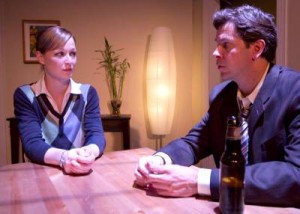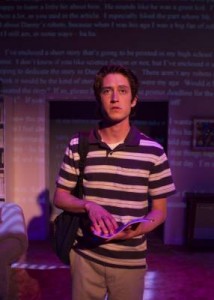
David Lindsay-Abaire’s Rabbit Hole, winner of the 2007 Pulitzer Prize for Drama, is making its Orange County debut in an absolutely brilliant production by the award-winning Chance Theater. Spoilers abound in this review, so if you know nothing about Rabbit Hole’s plot, read no further. Simply pick up the phone or go online and make a reservation to see it. Rabbit Hole is the kind of play where the less you know about it, the more it will affect you, and affect you it will … deeply.
Rabbit Hole is about grief, and the different ways that people deal with it. More specifically, it’s about perhaps the most terrible grief any human being can face, the irreparable loss of a small child.
What makes Lindsay-Abaire’s play a Pulitzer Prize winner and not a Lifetime Movie For Women is its unsentimental, un-clichéd, unpredictable script, and the humor which Lindsay-Abaire finds even in the heart of tragedy. What makes this production such a memorable one, and superior even to the Geffen Playhouse’s excellent West Coast Premiere, is the intimacy of its setting, the superb direction by Oanh Nguyen, and the inspired performances of its cast of five.
Rabbit Hole’s opening scene is deceptively benign. Becca (Jennifer Ruckman), a 30ish wife and mother, is folding the laundry, clothes which appear to be those of a four-year-old, and chatting with her spirited sister Izzy (Alex Bueno). Baby Sis has gotten herself into a barroom brawl, and in telling of it, lets slip that she’s pregnant. Little by little, it dawns on us that the clothes Becca is folding belong to a child who is no more, a little boy named Danny who not so long ago chased the family dog out into the street and was struck by a car and killed. What makes Danny’s death even more senseless is that the car was not speeding; its teenage driver could have done nothing to avoid hitting the boy, who must simply have materialized between parked cars. It just happened, in an instant, and no one’s life will ever be the same.
Becca’s husband Howie (Jonathan Lamer) deals with his grief by attending group therapy sessions and by endlessly watching videos of his son’s brief life. Becca copes, or attempts to cope, by making sure that nothing in her home reminds her of Danny. She has removed all pictures of him from the living room, is donating his clothes to charity, and has placed his beloved dog in the care of her mother Nat (Karen Webster). Becca’s husband clings to the familiar; Becca just wants to sell the house and move away.
It’s not merely Izzy’s pregnancy that prevents Becca from moving on. She has received a letter from the teenage driver Jason (Kevin Johnston), who has written a short story which he wants to dedicate to Danny, and has asked if it would be possible to meet Becca and Howie.
No way, says Howie. Becca is not so sure, and goes so far as to read Jason’s story, a tale of alternate universes which sets Becca’s mind to wondering, is there an alternate Becca whose life is happy, and could she possibly go down the rabbit hole and become that alternate version of herself?
The words “directed by Oanh Nguyen” are a virtual guarantee of a theatrical event. Never has this been more true than with Rabbit Hole. His understanding of the five characters has led to deeply moving performances. Several magical Nguyen touches and even his blocking are truly inspired.
In the role that won Cynthia Nixon a Tony, Jennifer Ruckman proves herself a young Meryl Streep. Ruckman understands that Becca’s grief must never be far from the surface, and seeing her deal with even mundane situations, one is aware that this is a woman struggling to preserve her sanity. When Becca finally breaks down during her scene with Jason, the tears come naturally, because they have always been there just under the surface. Ruckman’s performance is absolutely riveting … and devastating.
Jonathan Lamer does equally fine work as Howie. Standout moments include simply the look on Lamer’s face as he watches the last video taken of Danny, the mixture of disbelief, anger and sheer agony which accompanies his realization that Becca has taped over the only copy, and the explosion of barely controlled rage that greets Jason’s uninvited visit.
As Becca’s deceptively ditzy younger sister, Alex Bueno does her finest work yet. Bueno’s performance is totally natural and absolutely real, as is Karen Webster’s as Nat. Webster tends to get the “older women’s” roles at the Chance, and no one could play them better. Here she is the voice of reason, and her speech to Becca about how her own loss has stayed with her despite the passing of years is particularly heartfelt.
Finally, making his Chance debut is the deeply moving Kevin Johnston as Jason. Lindsay-Abaire could easily write a second play about Jason’s grief and guilt, and the scene in which he confesses to Becca his fear that he may have been driving two or three miles above the limit is heartbreaking, all the more so because Johnston underplays it so perfectly.
Now, about those Oahn Nguyen touches. There are surely more, but here are three that come to mind.
•When Jason appears on stage to read aloud the letter at the same time as Becca is reading it silently, we see Jason’s letter projected on the walls behind him and read his words with them.
•As Howie watches the video of Danny in the park, the living room walls become covered with a projection of grass and flowers. Howie has literally gone back in time and space.
•When Jason enters the living room through the open front door, Nguyen make sure that the four family members are on the opposite side of the stage. When they turn to confront him, it is almost as if Jason were facing an enemy firing squad, and since the other four actors are taller than Johnston, the effect is particularly powerful.
Major kudos to Masako Tobaru for the beautifully conceived and realized living room set and projections. (I’d wondered how the one scene not in the living room would be handled. Tobaru does it beautifully with a simple projection across the living room walls.) KC Wilkerson’s lighting is particularly effective in that scene and in the scene changes, which Nguyen’s direction allows to flow with particular smoothness. Mitchell Kohen’s sound design enhances Rabbit Hole’s shifting moods, and Erika C. Miller’s costumes are just right for each character.
Since Rabbit Hole is playing only twice weekly and for a limited run, make your reservations early. I predict many sold out houses for this must-see production, yet another jewel in the Chance Theater’s already diamond studded crown.
Chance Theater, 5552 E. La Palma Ave. Anaheim Hills.
www.chancetheater.com
–Steven Stanley
May 18, 2008
Photos: Doug Catiller




 Since 2007, Steven Stanley's StageSceneLA.com has spotlighted the best in Southern California theater via reviews, interviews, and its annual StageSceneLA Scenies.
Since 2007, Steven Stanley's StageSceneLA.com has spotlighted the best in Southern California theater via reviews, interviews, and its annual StageSceneLA Scenies.







 COPYRIGHT 2024 STEVEN STANLEY :: DESIGN BY
COPYRIGHT 2024 STEVEN STANLEY :: DESIGN BY